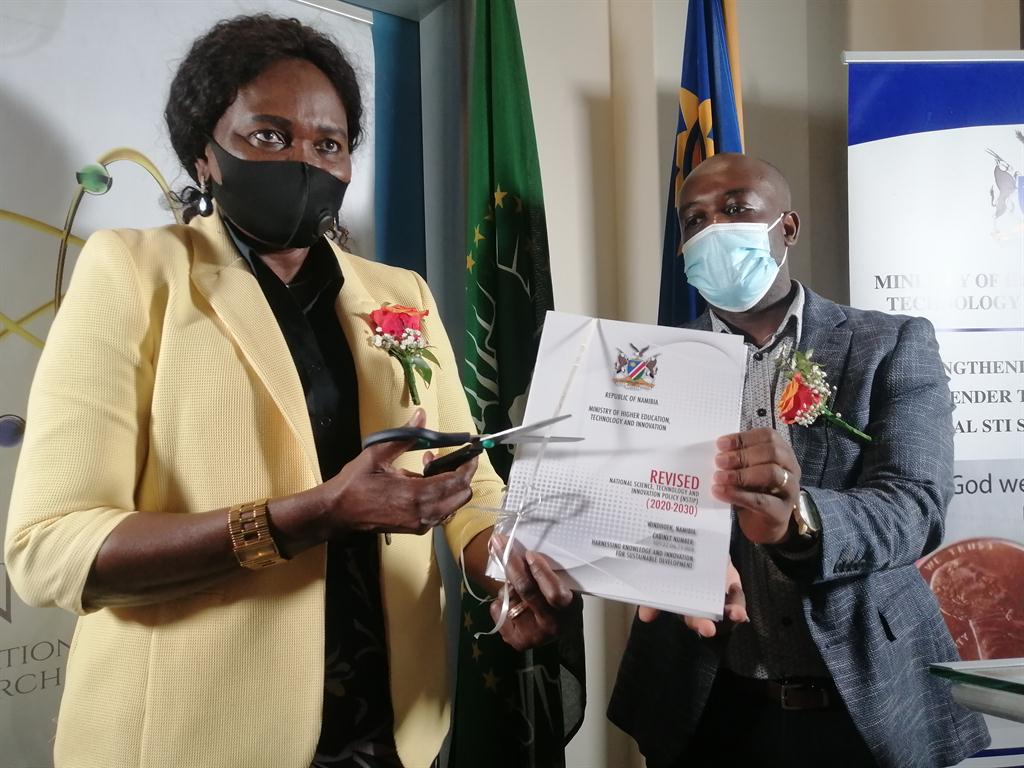We should produce our own medicine - Itah Kandjii-Murangi
Science and technology are vital in social development and economic growth, the minister said, urging Namibians to create our own goods and medicines.
ESTER KAMATI
WINDHOEK
The Covid-19 outbreak has exposed Namibia’s unpreparedness in mitigating natural and man-made calamities.
This according to the minister of higher education, technology and innovation, Itah Kandjii-Murangi, who added that it has “further exposed countries’ weak scientific and technical infrastructure and has laid bare the insignificant research and development budgets of many countries.
She said limited specialised laboratories hindered the participation of experts in finding solutions to fight the pandemic. She listed these as some of the reasons why developing countries became recipients of vaccines and services.
She was speaking at the launch of the National Science, Technology and Innovation Policy (NSTIP) for the period 2020-2030. The policy was revised for the first time since it was rolled out in 1999.
Produce our own medicine
“Through applied research and development, we should aim to work towards producing new goods, producing our own medicine, improving health services and developing new methods or improving existing ones to improve the different sectors.”
Making reference to Namibia’s raw material export culture, she said scientific knowledge and technology should be used to diversify from a resource-based economy to a knowledge-based one.
“It is time to deploy and employ good and relevant scientific know-how and smart technologies to begin to reverse this practice in some of the sectors, through value chain creation here at home, she said.
The minister further pointed out that science and technology are vital in social development and economic growth.
“The government is committed to improving and strengthening our science, technology and innovation ecosystem,” Kandjii-Murangi said.
Essential
Meanwhile, the ministry’s executive director Alfred Kent said the newly launched policy is essential in improving the country’s productivity and competitiveness.
National Council for Research, Science and Technology (NCRST) chairperson Nortin Titus shared that deliberations regarding the policy started in 2015 and 19 consultative meetings were held in preparation for the final version, which was launched on Friday and exists to promote the development of science and technology in Namibia’s socioeconomic growth.
Kandjii-Murangi told Namibian Sun that science development to the point of producing vaccines is possible in Namibia with incremental contribution towards research.
“We have some of the best scientists in the country and, for government, if we keep on putting in something for targeted research, we will get there.”
She added that “knowledge workers” at universities and industries should work collectively in the quest to identify developmental challenges and the creation of new knowledge.
[email protected]
WINDHOEK
The Covid-19 outbreak has exposed Namibia’s unpreparedness in mitigating natural and man-made calamities.
This according to the minister of higher education, technology and innovation, Itah Kandjii-Murangi, who added that it has “further exposed countries’ weak scientific and technical infrastructure and has laid bare the insignificant research and development budgets of many countries.
She said limited specialised laboratories hindered the participation of experts in finding solutions to fight the pandemic. She listed these as some of the reasons why developing countries became recipients of vaccines and services.
She was speaking at the launch of the National Science, Technology and Innovation Policy (NSTIP) for the period 2020-2030. The policy was revised for the first time since it was rolled out in 1999.
Produce our own medicine
“Through applied research and development, we should aim to work towards producing new goods, producing our own medicine, improving health services and developing new methods or improving existing ones to improve the different sectors.”
Making reference to Namibia’s raw material export culture, she said scientific knowledge and technology should be used to diversify from a resource-based economy to a knowledge-based one.
“It is time to deploy and employ good and relevant scientific know-how and smart technologies to begin to reverse this practice in some of the sectors, through value chain creation here at home, she said.
The minister further pointed out that science and technology are vital in social development and economic growth.
“The government is committed to improving and strengthening our science, technology and innovation ecosystem,” Kandjii-Murangi said.
Essential
Meanwhile, the ministry’s executive director Alfred Kent said the newly launched policy is essential in improving the country’s productivity and competitiveness.
National Council for Research, Science and Technology (NCRST) chairperson Nortin Titus shared that deliberations regarding the policy started in 2015 and 19 consultative meetings were held in preparation for the final version, which was launched on Friday and exists to promote the development of science and technology in Namibia’s socioeconomic growth.
Kandjii-Murangi told Namibian Sun that science development to the point of producing vaccines is possible in Namibia with incremental contribution towards research.
“We have some of the best scientists in the country and, for government, if we keep on putting in something for targeted research, we will get there.”
She added that “knowledge workers” at universities and industries should work collectively in the quest to identify developmental challenges and the creation of new knowledge.
[email protected]




Comments
Namibian Sun
No comments have been left on this article